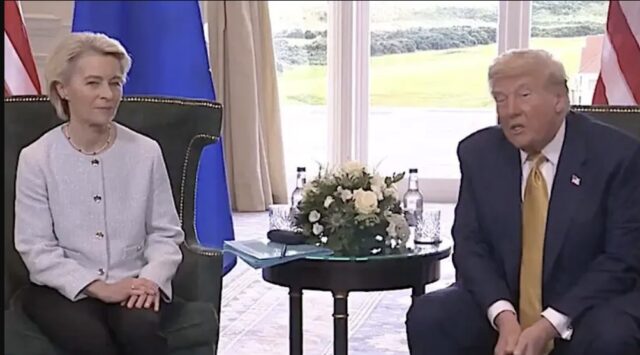The EU has essentially handed Trump everything he asked for in his recent trade negotiations. The European Commission accepted an asymmetrical deal, agreeing to remove tariffs on U.S. industrial goods in exchange for the U.S. cutting tariffs on European cars. U.S. car tariffs dropped from 27.5% to 15%, while the EU will lift or reduce duties on a range of American goods, including some agricultural products.
Brussels must cut more tariffs and increase purchases of U.S. energy, while Washington still maintains duties on 70% of EU exports. EU governments accepted the lopsided deal after Trump threatened 30% tariffs on nearly all European imports. The EU will make concessions on products such as potatoes, tomatoes, pork, cocoa, and pizza, while retaining protections for beef, poultry, rice, and ethanol.
On Monday, the EU went further, announcing a six-month suspension of planned countermeasures against U.S. tariffs, a clear concession after being forced to accept the 15% tariff rate covering autos, auto parts, pharmaceuticals, and semiconductors. The legislative proposal still requires approval from EU governments and the European Parliament, a process that may take weeks.
Some U.S. tariffs remain steep, 50% on steel, aluminum, and copper, while products like aircraft and generic drugs are exempt. Digital services were not addressed, though Trump has threatened new tariffs on countries imposing digital taxes. In effect, the agreement offers Europe only limited relief on cars and a few goods while leaving significant U.S. tariffs in place, underscoring Washington’s leverage.
Brussels had long believed its economic weight gave it bargaining power, but Trump’s escalating tariff threats convinced EU leaders that resisting risked a devastating trade war. Fearing damage to key industries like autos and pharmaceuticals, and worried retaliation would provoke even harsher measures, they conceded.
The impact is already visible in foreign investment. Europe’s FDI fell 5% in 2024, dropping to a nine-year low and 11% below 2019 levels. Out of 500 businesses surveyed, 37% postponed, canceled, or scaled back investment plans. Major economies were hit hardest: the UK recorded 853 projects, down 13% from 2023; France, though still first in Europe with 1,025 projects, fell 14%; and Germany, with 608 projects, dropped 17%.
The U.S. victory goes far beyond favorable trade terms. It cements America’s role as the dominant global economic and diplomatic power while reinforcing Trump’s reputation as a dealmaker. Tariff revenues have already climbed to a record $150 billion in 2025, including $28 billion in July alone.
On defense, NATO allies agreed to raise military spending from 2% to 5% of GDP by 2035, with each member required to submit annual plans outlining a credible path to the goal. Already, 31 of 32 NATO members have met the 2% benchmark. NATO Secretary General Mark Rutte remarked, “Would you ever think this would be the result of this summit if he had not been re-elected president? I think he deserves all the praise.”
Under tariff pressure, the EU pledged to invest $600 billion in the United States during Trump’s term and to purchase $750 billion of U.S. energy exports through 2028. European officials later clarified that the $600 billion figure referred to private-sector investment “intentions” rather than a lump-sum EU commitment. Still, Trump warned that failure to meet the pledge would trigger 35% tariffs.
The strategy worked. In 2024, Europe accounted for $96.7 billion, 64% of all new U.S. investment, driving a $332.1 billion increase in America’s overall FDI position, which reached $5.71 trillion by year’s end. Europe alone contributed $204.7 billion of that growth, led by a $52.9 billion rise from the UK and a $39.7 billion increase from Germany.
Companies are explicitly investing to bypass tariffs and maintain access to the U.S. market. fDi Intelligence reported $200 billion in new capital expenditure pledges by foreign firms between January and April 2025 directly tied to Trump’s demands. Over half of manufacturing CFOs said they are diversifying supply chains, nearly 40% accelerated purchases ahead of tariffs, and many sought new suppliers.
This “reverse magnetic effect” has made Europe a less attractive investment destination while pulling capital and industry across the Atlantic. Major announcements underscore the trend.
Taiwan Semiconductor Manufacturing Company committed an additional $100 billion to expand operations in Arizona, the largest single FDI project in U.S. history, while CBC Global Ammunition pledged a $300 million expansion in Oklahoma and India’s Waaree Energies announced a $200 million investment in U.S. battery storage production.
Critics across Europe denounced the deal as a political surrender, while officials admitted that broader concerns, NATO, Ukraine, and transatlantic security, factored into their decision. Reactions from European leaders ranged from reluctant acceptance to outright condemnation. French Prime Minister François Bayrou called it a “dark day” when the EU “resigns itself to submission.” Spain’s Pedro Sánchez said he would support the deal “without any enthusiasm.” Sweden’s Trade Minister Benjamin Dousa described it as “maybe the least bad alternative,” while Hungary’s Viktor Orbán quipped that Trump “ate von der Leyen for breakfast.”
By contrast, European Commission President Ursula von der Leyen defended the agreement as “solid if imperfect,” acknowledging discontent over the painful 15% tariff imposed on most EU exports to the U.S. Despite the criticism, the data shows America retains dominant economic leverage, and the outcome demonstrates Washington’s continued ability to set global trade terms. Trump’s forceful approach has secured major concessions and reshaped global trade rules, leaving Europe frustrated but resigned.









